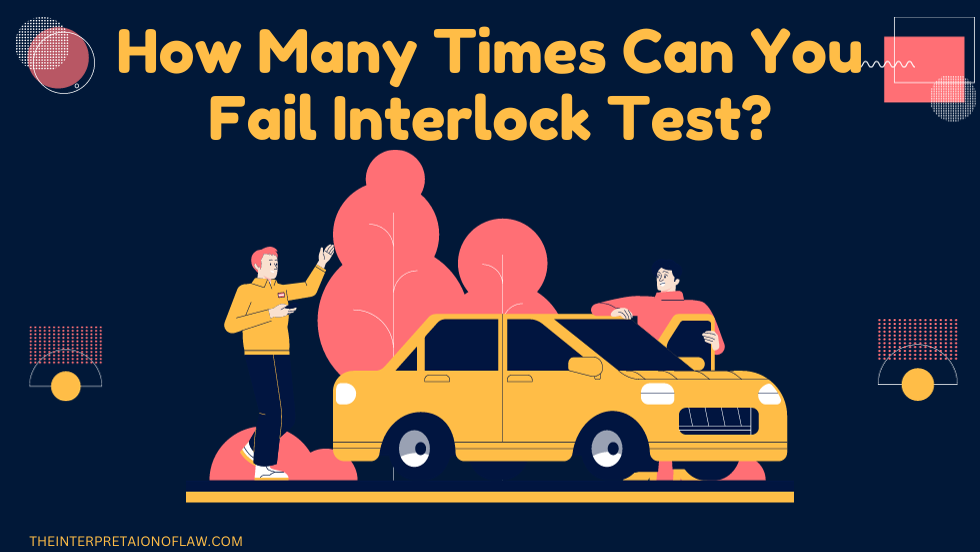Explanation of what an interlock violation is –
An interlock violation is a legal term used to describe a situation where an individual has violated their court-ordered requirement to install and use an ignition interlock device (IID). This device is used in vehicles as part of a sentence for driving under the influence (DUI) or other related offenses.
Interlocks are electronic devices that are installed in a vehicle’s ignition system and require the driver to pass a breathalyzer examination before the vehicle can be started. This is essential in preventing repeat DUI offenses, as it ensures that individuals cannot operate a vehicle while under the influence of alcohol.
However, if an individual fails to comply with their IID requirement or attempts to circumvent the device, they commit an interlock violation. In this post, we will discuss how many interlock violations you can have in Texas, as well as the consequences of failing to comply with IID requirements.
How Many Interlock Violations Can You Have?
The number of interlock violations an individual can have varies depending on their state’s specific laws and regulations. In some places, even a single violation may result in severe consequences such as fines, extended IID use, or even jail time.
In addition to the potential legal repercussions, multiple interlock violations can reflect poorly on an individual’s overall compliance and rehabilitation efforts. This can question their commitment to following court-ordered requirements and may result in stricter penalties.
It is essential for individuals with an IID requirement to understand the consequences of interlock violations in their state fully and to take all necessary precautions to avoid them.
What are the Consequences of of Multiple Violations?
Each state has rules and regulations regarding interlock violations, so the consequences may vary. However, some common consequences of multiple violations may include:
- Increased fines
- Extended use of the IID
- License suspension or revocation
- Mandatory alcohol rehabilitation programs
- Possible jail time
- Confiscation of the vehicle
- Harsher penalties for any future DUI offenses
Interlock fail consequences, in particular, can be severe, as it shows an apparent disregard for the safety of oneself and others on the road. It also indicates a lack of compliance with court-ordered requirements, which can lead to stricter consequences and penalties.
It is important to note that repeat violations may also result in extending an individual’s IID requirement or even canceling their restricted license.
State laws regarding multiple violations
Texas Interlock Violation:
In Texas, a first-time interlock violation is considered a Class C misdemeanor and can result in a fine of up to $500. However, subsequent violations are taken more seriously and may result in extended IID use or even jail time.
California Interlock Violation:
California has strict laws regarding multiple interlock violations. A second offense within seven years of the first can result in a mandatory jail sentence of 96 hours to one year, additional fines, and extended IID use.
New York Interlock Violation:
In New York, multiple interlock violations can result in significant consequences such as increased fees, longer IID use, or even revocation of driving privileges.
What is the Blood Alcohol Content Limit for Driving?
For drivers 21 years or older- In most states, the legal limitation for Blood Alcohol Content (BAC) is 0.08%. This means that if an individual’s BAC is at or above this level while operating a vehicle, they are thought to be driving under the influence and can face serious consequences.
For drivers under 21 years- For individuals under 21 years of age, there may be zero tolerance laws in place. Any trace of alcohol in their system while driving can result in a DUI offense and other penalties.
However, it’s important to note that even if an individual’s BAC is below the legal limit, they may still be charged with a DUI if their driving is impaired by alcohol or drugs. It’s always safest to avoid consuming any amount of alcohol before driving.
What are the Major Reasons of Interlock Violations?
Interlock violations can occur for a variety of reasons, but some common causes include:
- Attempting to drive a vehicle while under the effect of alcohol
- Failing to maintain or calibrate the IID device properly
- Tampering with or attempting to circumvent the IID device
- Need to schedule appointments to have the device serviced or data downloaded.
It is essential for individuals with an IID requirement to understand these potential violations fully and to take all necessary precautions to avoid them. Any violation can have serious consequences, making it crucial for individuals to prioritize safety and compliance while using their interlock devices.
How Ignition Interlock Device Work?
Ignition interlock devices work by requiring the driver to take a breathalyzer test before starting their vehicle. If the device detects alcohol above a certain level, the vehicle will not start. The device also requires random driving tests to ensure the individual does not consume alcohol after starting the vehicle.
The device records all results and sends them to monitoring authorities for review. This allows for accurate tracking of compliance and any potential violations. Additionally, the IID may also have a camera installed to ensure that the driver is the one taking the breathalyzer test.
Overall, ignition interlock devices are crucial in preventing repeat DUI offenses and promoting safer roads for all individuals. Individuals with an IID requirement need to understand how these devices work fully.
How to Avoid Interlock Violation Detection?
The best way to avoid interlock violations is always to follow the rules and regulations your state sets. This includes:
- Abstaining from alcohol consumption while using an IID
- Properly maintaining and calibrating the device as required
- Attending all scheduled appointments for servicing and data collection
- Avoiding any attempts to tamper with or circumvent the device
- It is also essential to be aware of any medications or products containing alcohol and to disclose this information to the monitoring authorities if necessary.
Frequently Asked Questions
What are the reasons of accidentally failing an Ignition Breath Test?
Some common reasons for accidentally failing an ignition breath test may include:
- Using mouthwash or other products containing alcohol
- Consuming certain medications or foods that may contain alcohol
- Improperly blowing into the device, such as too softly or too forcefully
It’s essential to read and follow all instructions the device manufacturer provides and disclose any potential issues to the monitoring authorities. Overall, it’s best to avoid consuming alcohol or using products that may affect the breath test while under an IID requirement.
Can I drive someone else’s vehicle with an Ignition Interlock Device?
It is essential for individuals with an IID requirement only to operate a vehicle equipped with the device. Driving someone else’s vehicle without an IID could result in a violation and serious consequences. If you need to use someone else’s vehicle, ensure it is equipped with an IID or make alternative transportation arrangements.
What should I do if my Ignition Interlock Device malfunctions?
Contact the manufacturer or monitoring authorities immediately if you experience any issues or malfunctions with your ignition interlock device. Attempting to fix or tamper with the device yourself could result in a violation. It is essential to address any issues promptly to ensure accurate results and compliance with your IID requirement.
Conclusion
Interlock violations can have serious consequences, and individuals must fully understand the laws and regulations surrounding these devices.
We hope you get the answer about how many times can you fail interlock . Remember always to prioritize safety and compliance while using an IID.
By following all rules and adequately maintaining the device, individuals can complete their IID requirements and keep our roads safer for everyone.
More Related Post:
How to Prove You Were Not Served Properly? Fairness & Due process
References:
- https://dmv.vermont.gov/faq/what-happens-if-i-fail-the-breath-test-when-i-try-to-start-my-car
- https://www.dmv.ca.gov/portal/driver-education-and-safety/educational-materials/fast-facts/ignition-interlock-devices-ffdl-31/
- https://www.mass.gov/guides/ignition-interlock-device-program

Carter Wilson is a licensed lawyer with over 10 years of experience in various legal fields. He is passionate about making law accessible to the general public and helping individuals navigate through complex legal matters.

